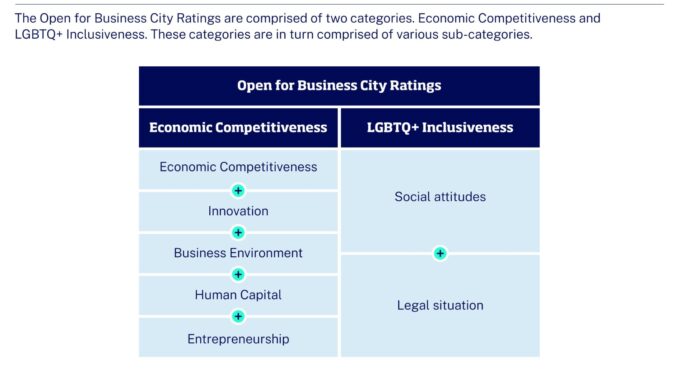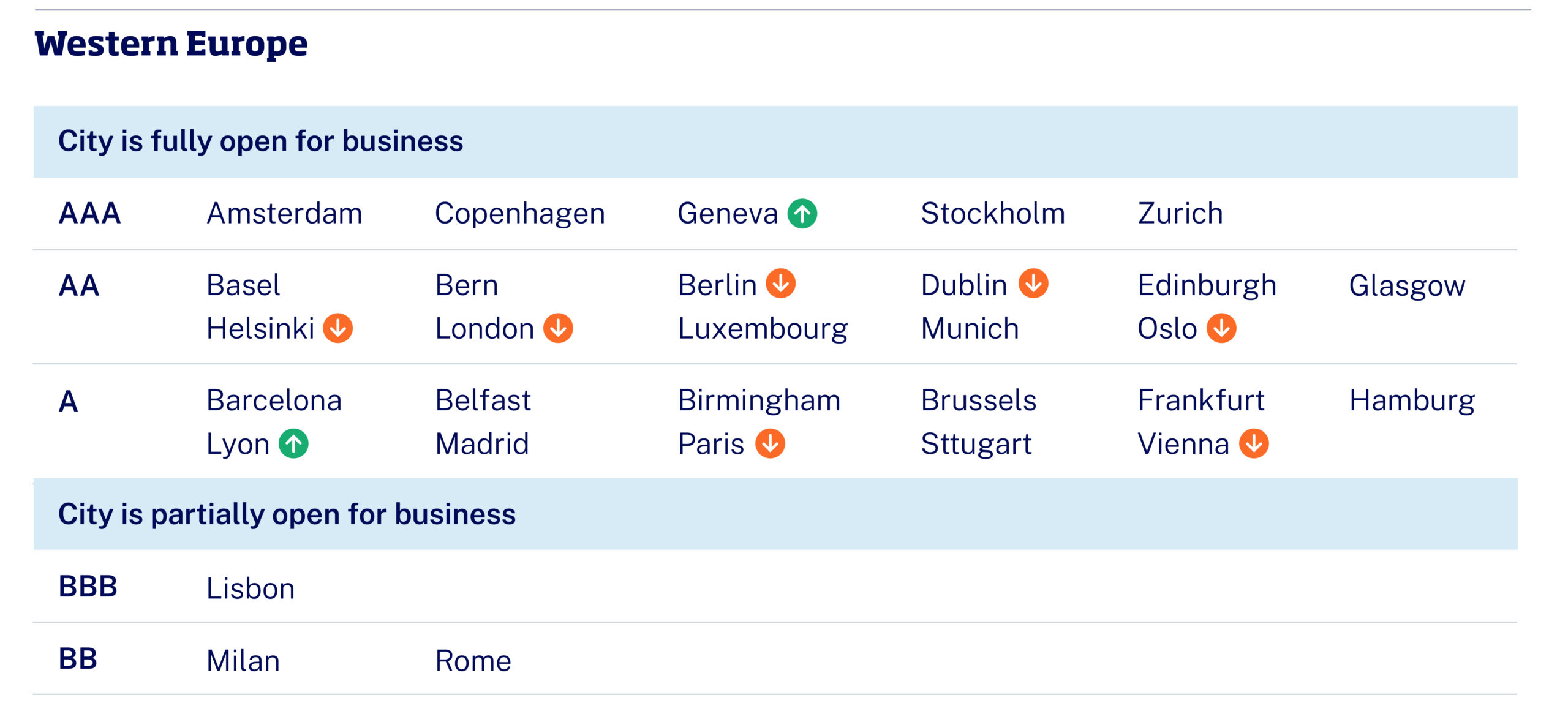
Why we should cherish women over 50
Multigenerational teams bring competitive advantages. It’s vital to tap into the wisdom and experience of older workers, urges Shelley Zalis....
Audio available

by Francesca Annalisa Petrella, Fernando Alonso Pérez-Chao, Luca Condosta Published August 20, 2025 in Diversity, Equity, and Inclusion • 9 min read
A striking paradox emerges from two new global research reports: while public support for corporate LGBTQ+ initiatives continues to decline, cities and organizations that embrace inclusion are achieving dramatically superior economic performance. This contradiction creates both a strategic challenge and a competitive opportunity for business leaders and politicians.
The data reveals a fundamental disconnect between public sentiment and economic reality. While the 26-country Ipsos Pride Survey 2025, which researches public sentiment, shows that support for companies actively promoting LGBTQ+ equality has declined to 41% globally, the Open for Business City Ratings 2025 findsthat inclusive cities achieve four times stronger human capital performance, double the innovation scores, and 2.5 times higher entrepreneurship scores compared to their less inclusive counterparts.
The message for business and political leaders: look beyond surface-level sentiment and focus on underlying economic fundamentals that drive competitive advantage.
This decline in support for LGBTQ+ inclusion occurs against a backdrop of sustained societal shifts. Support for same-sex marriage in the US has decreased from 74% in 2021 to 69% in 2025, while opposition to any legal recognition for same-sex couples has grown from 12% to 15%.

However, research on urban economic performance tells a dramatically different story. The Open for Business City Ratings 2025 report, which benchmarks 149 cities globally across economic competitiveness and LGBTQ+ inclusiveness, finds that inclusive cities consistently outperform their peers across measurable economic indicators. Cities in the top quartile of LGBTQ+ inclusion show four times stronger human capital performance compared to those in the bottom quartile. They also demonstrate innovation scores that are twice as high, and 2.5 times higher entrepreneurship scores.
This stark contrast between declining public support and proven economic benefits creates a strategic imperative for business leaders to look beyond surface-level sentiment and focus on underlying economic fundamentals. The report reveals that inclusive cities don’t just perform better socially – they create measurable economic advantages in talent attraction, innovation, and long-term resilience.
Perhaps nowhere is the economic case for inclusion more compelling than in talent markets.
Perhaps nowhere is the economic case for inclusion more compelling than in talent markets. According to the WEF Future of Jobs Report 2025, “job disruption will equate to 22% of jobs by 2030, with 170 million new roles set to be created and 92 million displaced, resulting in a net increase of 78 million jobs. Technological advancements, demographic shifts, geoeconomic tensions, and economic pressures are the key drivers of these changes, reshaping industries and professions worldwide.” These trends make adaptability and innovation critical organizational capabilities.
![[Chart and data as CSV available here: https://www.ipsos.com/en/ipsos-pride-survey-2025] [Chart and data as CSV available here: https://www.ipsos.com/en/ipsos-pride-survey-2025]](https://www.imd.org/wp-content/uploads/2025/08/gen-gap-680x537.jpeg)
The generational workforce shift also amplifies these dynamics. One in 20 Baby Boomers identifies as LGBTQ+, compared with 14% of Gen Z, however, research reveals significant internal tensions within this cohort. Gen Z women show more support for LGBTQ+ workplace initiatives compared to Gen Z men (around 15–24 percentage points higher), with 58% of young women favoring companies that actively promote equality versus only 34% of young men.
These demographic trends create both challenges and opportunities. Organizations must prepare for a workforce where authenticity and inclusion become increasingly important retention factors, particularly if 14% of Gen Z adults identify as LGBTQ+. In addition, the data from talent flows tracked through anonymized LinkedIn information shows clear patterns of movement from less inclusive to more inclusive countries, regions, and cities, suggesting that inclusion operates as a ‘pull factor’ and competitive advantage in the war for talent.
For multinational organizations, the data reveals dramatic geographic variations that require sophisticated strategic responses. Support for corporate LGBTQ+ promotion ranges from 72% in Thailand to just 22% in South Korea, creating significant challenges for maintaining global brand integrity and consistency while adapting to local markets.
The research suggests that successful global strategies are a delicate balance, requiring customization of initiatives based on cultural context while maintaining consistent core values. This approach demands significant investment in understanding local cultural, social, and legal landscapes, often requiring partnerships with local experts who can guide respectful and appropriate implementation.
Economic data supports this nuanced approach. Cities like Bangkok have emerged as regional leaders following Thailand’s marriage equality legislation, while other markets present opportunities for private sector leadership where public policy lags business needs. In this context, the EQUALDEX Index is a comprehensive research project into the current status of LGBT rights, laws, and freedoms as well as public attitudes towards LGBT people and how these align or contrast in specific countries.
A robust research methodology becomes crucial for business leaders seeking to navigate this apparent contradiction between declining public support and strong economic performance.
The most successful organizations integrate multiple data sources, combining quantitative metrics with qualitative insights and contextual understanding. This includes regular collection and analysis of diversity and inclusion data to identify gaps, understand employee sentiments, and track progress over time. Engaging stakeholders from diverse backgrounds provides essential perspectives and fosters ownership of inclusion initiatives.
However, leaders must avoid oversimplifying the interpretations of inclusion dynamics. While numerical data provides important baselines, contextual understanding and qualitative insights prove equally valuable for developing effective strategies. The research demonstrates that opposition to LGBTQ+ initiatives has remained relatively steady, with only 12% “strongly opposed” to brand promotion, suggesting that the perception of widespread “wokelash” may be more nuanced than media coverage suggests.
For organizations operating in competitive markets, inclusion offers a pathway to differentiation through enhanced innovation capacity.
The correlation between inclusion and innovation extends beyond talent attraction to fundamental organizational capabilities. Research consistently demonstrates that inclusive environments foster creativity, problem-solving, and adaptability – capabilities that become increasingly valuable in rapidly changing business environments.
For organizations operating in competitive markets, inclusion offers a pathway to differentiation through enhanced innovation capacity. The data shows that inclusive cities demonstrate not only stronger human capital performance but also measurably higher innovation outputs, suggesting that inclusion contributes directly to competitive advantage rather than simply reflecting progressive values.
This ‘innovation dividend’ becomes particularly relevant as organizations face increasing pressure to adapt to technological change and evolving consumer expectations. The ability to attract and retain diverse talent while creating environments that enable authentic self-expression translates directly into enhanced organizational agility and creative problem-solving capacity.
The economic evidence suggests that this long-term commitment pays measurable dividends.
Despite short-term fluctuations in public opinion, the research supports a long-term strategic approach to inclusion. Organizations that embed inclusive practices into fundamental business strategies and core values, rather than treating them as temporary marketing initiatives, demonstrate greater resilience to the ebb and flow of external attitudes.
This strategic embedding requires moving beyond surface-level declarations to incorporate inclusion principles directly into all organizational operations, from internal policies to external branding and creating authentic advocacy that sustains momentum regardless of shifts in public opinion.
The economic evidence suggests that this long-term commitment pays measurable dividends. Organizations that maintain consistent inclusion strategies while adapting tactical approaches to local contexts position themselves advantageously for future talent competition and market opportunities.
Open for Business met members of the European Parliament to share the results of the Cities report, and were told European cities and regions face a unique opportunity to leverage inclusion as a competitive differentiator in global innovation landscapes. With the European Union’s renewed focus on competitiveness, LGBTQ+ inclusion represents an underutilized strategic asset.
In its Future of Jobs Report 2025, the World Economic Forum predicts that “digitalization, climate mitigation and rising cost of living are the key trends expected to impact labor market transformation in Europe over the 2025–2030 period. As companies headquartered in the region aim to adjust to these trends, skills gaps and talent shortages in the labor market remain a key barrier with more than half (54%) of employers expecting talent availability to worsen, significantly above the global average.
Simultaneously, the continent competes with North American and Asian markets for top global talent.” Research indicates that inclusive environments provide measurable advantages in this competition. Copenhagen leads globally with an AAA rating in the Open for Business City Ratings, setting benchmarks for combining sustainability, innovation, and inclusion. In Western Europe, Swiss cities like Zurich and Geneva dominate rankings through systematic approaches to inclusion, while Amsterdam and Stockholm also achieve top-tier performance by integrating inclusion into broader economic development strategies. Inclusive cities – those ranking AAA – are also located in the world’s most competitive economies, with Switzerland leading, Denmark fourth, Sweden eighth, and the Netherlands 10th in the 2025 World Competitiveness Ranking.

For European policymakers, the data suggests several strategic imperatives:
Economic integration: The most successful European cities integrate LGBTQ+ inclusion into comprehensive economic strategies rather than treating it as a separate social policy. This integration creates measurable returns through enhanced talent attraction and retention.
Innovation acceleration: Inclusive environments demonstrate 2.0 times higher innovation scores, providing European regions with opportunities to accelerate technological advancement and entrepreneurship through systematic inclusion policies.
Global differentiation: As younger, more diverse workforces increasingly prioritize authentic inclusion, European commitment to these values creates sustainable competitive advantages in the global war for talent.
The research reveals a “virtuous circle” where inclusive cities attract diverse talent, foster innovation, enhance economic performance, enable further inclusion investments, and attract additional talent and capital. European cities positioned to execute this cycle effectively will gain significant advantages in global competition for skilled workers and innovative enterprises.
Based on a comprehensive analysis of global attitudes, urban economic performance, and talent market dynamics, business leaders should focus on these priorities:
Is our inclusion strategy embedded in core business processes or limited to campaigns?

Head of Communications at Ipsos
Francesca Annalisa Petrella is Head of Communications at Ipsos with ten years of experience in strategic communication, media relations, marketing, and digital PR. Petrella leads integrated campaigns to enhance brand reputation and visibility and serves as Diversity, Equity and Inclusion Manager, with a strong focus on social trends, sustainability, and inclusion. Petrella also contributes as a content curator on CSR-related topics, is co-founder of Osservatorio Civic Brands, and a collaborator with Digital Innovation Days.

Director of Global Engagement at Open For Business
Fernando Alonso Pérez-Chao is Director of Global Engagement at Open For Business, leading economic research and global engagement on the economic benefits of inclusion. A former World Economic Forum equity and inclusion lead, Pérez-Chao is passionate about building evidence-based cases for inclusive economies.

Head of Social Progress and Sustainability Capability building, LGBTQ+ Global Program
Luca Condosta is a transformational leader with a robust track record of driving change at the intersection of people, sustainability, and data. With a deep commitment to diversity, equity, and inclusion, his expertise spans over 20 years across multiple sectors, including telecommunications, oil and gas, and energy. He holds a PhD in business administration from Catholica University (Milan) with a focus on sustainability strategy, and master’s degrees in sustainable leadership, and business and climate change from Cambridge University. Luca was named on the 2024 Outstanding Role Model List that recognizes executives who paved the way for LGBTQ+ inclusion at work.

January 22, 2026 • by Shelley Zalis in Diversity, Equity, and Inclusion
Multigenerational teams bring competitive advantages. It’s vital to tap into the wisdom and experience of older workers, urges Shelley Zalis....
 Audio available
Audio available
January 21, 2026 • by Rupa Dash in Diversity, Equity, and Inclusion
As women live longer, society must rethink careers and leadership to unlock a longevity-equality dividend that enables women to contribute and lead at every life stage....
 Audio available
Audio available
October 24, 2025 • by Luca Condosta, Alexander Fleischmann in Diversity, Equity, and Inclusion
Companies gain performance advantages through LGBTQ+ inclusion, yet nearly nine in 10 Swiss firms lag. Here’s how leaders can close the gap....

October 21, 2025 • by Vanina Farber in Diversity, Equity, and Inclusion
When talk of diversity triggers backlash, leaders face a paradox: how to advance inclusion goals while choosing language that keeps dialogue alive in hostile environments....
Explore first person business intelligence from top minds curated for a global executive audience